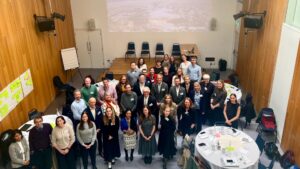We Must Protect Our Democracies Before It Is Too Late
The last several years have shown us just how vulnerable our democracies are to corrupting foreign influence. The harms are multiple: money is stolen from poor- and middle-income countries. Instead of being spent on roads, defense, education or nurses, it goes to luxury yachts, vacation homes, and prestige projects. Worse, it goes to shoring up impunity for the thieves themselves – the kleptocrats – who silence their critics at home, often violently, and seek to muddy the waters abroad. Qatargate is the most high-profile such case but hardly the only one. Such corruption undermines security across the Atlantic and beyond, destabilizing regions and fueling conflict.
Russia’s full-scale invasion of Ukraine is a poignant example. The invasion by a kleptocratic regime underscores the critical intersection of corruption and authoritarianism. Ukraine, committed to rooting out corruption and aligning with the Transatlantic community, is paying an unacceptable price for our collective failure to curb illicit finances and illegitimate political influences. This war is a bitter reminder of our shared responsibility and interconnectedness.
All of this would not be possible, however, without the help of people in the West. What if we told you that Western European and North American companies were often helping these kleptocrats clean their dirty money and launder influence? Our financial and institutional systems are allowing corrupt money to be parked in Western countries while shady owners can hide behind shell companies, and feed corruption, autocracy, and nepotism. This erosion is not just a distant threat, it has a tangible impact on the West, including energyEnsuring universal access to sustainable, dependable, and affordable energy is critical to every aspect of prosperity. Increasing public oversight and transparency in the energy sector can help to ens... More dependence on Russia, weakened democracies, inflated real estate prices, and the rise of extremist political forces.
As democratic institutions falter, so too does the rule of law. The World Justice Project’s Rule of Law Index reveals a troubling trend: five consecutive years of democratic decline. From 2015 to 2022, 62 percent of countries saw increased corruption, 68 percent experienced fewer checks on public powers, and 52 percent had less open government. To reverse this, we must strengthen the rule of law and promote open governance—crucial steps for bolstering democracy. Additionally, curbing those who enable corruption is essential for a global democratic resurgence. Without decisive action, we risk further erosion of our democratic foundations.
A new report by the National Democratic Institute and the Open Government PartnershipThe Open Government Partnership (OGP) is a multi-stakeholder initiative focused on improving government transparency, ensuring opportunities for citizen participation in public matters, and strengthen... More outlines the following key steps that jurisdictions can take to ensure that they are not the weakest link in our shared democratic security. This is especially significant before next week’s European parliament electionsImproving transparency in elections and maintaining the independence of electoral commissions is vital for promoting trust in the electoral system, preventing electoral fraud, and upholding the democr... More which will determine policies with huge implications for the whole democratic community.
- Improving beneficial ownershipDisclosing beneficial owners — those who ultimately control or profit from a business — is essential for combating corruption, stemming illicit financial flows, and fighting tax evasion. Technical... More: Anonymity is the “getaway car” of corrupt and kleptocratic practices, using nesting dolls of shell companies and trusts to create complexity and obscurity. As the EU moves into 2024, with a new European Parliament, ensuring that watchdog organizations and civil society groups have access to reliable, verified beneficial ownership data must be a priority. Identifying the real human beneficiaries behind companies is crucial to dismantling corruption.
- Strengthening Anti-Money Laundering Obligations on Bank and Non-Bank Professionals: The Sixth Anti-Money Laundering Directive expanded the obligations of professionals to protect the integrity of our financial systems. With the AML Directive going into effect, national governments have an obligation to seek aggressive transposition and implementation of these regulations, and supervisory bodies have the opportunity to support professionals in de-risking their portfolios by ensuring that their clients are following the law.
- Strengthening Anti-Corruption Investment Screening: While the US and UK have screening processes, they remain the exception to the rule. Although 62 countries have acquisition and ownership-related policies focused on national security threats, they do not focus on corruption or money laundering. Strengthening these considerations can help to protect national assets, not only in defense, but across the supply chain. Making risk assessments public can help shore up confidence that investors are law-abiding and willing to support democracy regardless of their origin.
Our democracies are at a critical juncture. The forthcoming European Parliament elections offer an opportunity to enact the bold financial reforms needed to protect institutions from authoritarian and corrupt interference.
The technical options outlined by NDI and OGP require not just expert knowledge but also bold political leadership. Ignoring these issues will only lead to more severe crises, with devastating financial and human costs for future generations.
In this pivotal moment, our response will shape the future of democratic resilience and security. It’s time to clean our own houses and strengthen our democracies, reinforcing the global fight against kleptocracy and corruption. The urgency of these reforms cannot be overstated. We must act now, before it is too late.
No comments yet
Related Content

Countering Kleptocracy through Open Government and Democratic Oversight
Kleptocracy, "rule by thieves," distorts state institutions for elite gain, harming source and host countries. Explore a two part series by The National Democratic Institute and OGP that offer actionable…
 Challenges and Solutions
Challenges and Solutions
Using Open Gov Week to Rise to the Challenge
Join us as we celebrate the diversity and innovation of Open Gov Week 2024 by showcasing events from Africa to the Americas, from Asia-Pacific to Europe.
 Challenges and Solutions
Challenges and Solutions
Four Steps Towards Fiscal Openness
The OGP Nordic+ group met in April 2024 and again during Open Gov Week to discuss how to advance fiscal transparency and enhance participation in fiscal policy. From these discussions,…


Leave a Reply